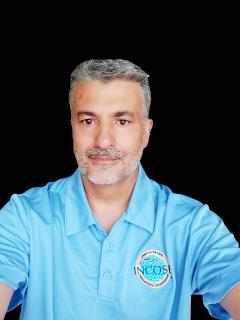This interview was conducted in 2021. 
Q1: Describe your current position/role.
Bernardo A. Delicado has been a professional systems engineer for 28 years in the aerospace and defense sector in Europe. For the first eight years he was employed by INTA, the aerospace agency of the Spanish government working on a great number of European research projects. Following that time, he spent twelve years with Airbus Defense and Space assuming a wide range of technical roles with transnational responsibilities within military aircraft programs developed among the UK, France, Germany, Italy and Spain. In 2011, Bernardo moved to MBDA Missile Systems (Airbus Group), assuming the role of Engineering Director to Spain conducting a large part of his responsibilities embedded in multinational teams in France and the UK. In March 2020 he joined Indra Sistemas as NGWS (New Generation Weapon System) Chief Engineer and Systems Engineering Director as part of the Future Combat Air System (FCAS) Program, a tri-national program between France, Germany and Spain.
Bernardo has a PhD in Interdisciplinary Engineering, M.S in Physics and a B.S in Aerospace Engineering. Founding member of AEIS (Spanish Chapter of INCOSE) in 2012 being its President from 2014 to 2015, currently is the Technical Director of AEIS. He is an ESEP, editor of SEBoK Part 5 (Enabling Systems Engineering), member of the Editorial Board for INCOSE Systems Engineering Handbook 5th Edition and member of Industrial Committee of Complex Systems Design & Management (CSD&M) conference in France.
Q2: What are one or two of your proudest professional accomplishments?
By education Bernardo is an Aerospace Engineer, and his original technical career was in aerodynamics and aircraft electro-magnetic compatibility (EMC). From 2001 to 2003, he led the development of a new EMC test facility which would host certification testing of High Intensity Radiated Fields (HIRF) for the Eurofighter Typhoon. In 2004, he received an innovation award for his contributions to the qualification for the same aircraft by British Aerospace Systems in the UK. While at Airbus, Bernardo saw the gap between senior and junior engineers and in 2009 led an internal post-graduate program Master in Aircraft Systems Integration in partnership with the Carlos III University of Madrid for younger employees in which they learned the broad view of the product and how the day-to-day work influenced the product. They learned about systems engineering, lifecycle, integration, and so forth. He is very proud of these accomplishments.
Q3: What is the biggest challenge you face as a Systems Engineer?
While most companies are seeing the value of uniform processes and investing money in Systems Engineering, Bernardo believes engineers still sometimes struggle with systems thinking. One particular problem is having a common language. This takes time to develop.
Q4: What advice do you have for individuals starting their career as a Systems Engineer?
Bernardo recommends that junior Systems Engineers lay a strong technical foundation in whatever technical field they have studied. The Systems Engineering skills can be built on top of that. While there are Systems Engineering degrees, most SE skills are learned not through academics, but through day-to-day learning. It probably takes 15 years to have full Systems Engineering experience. Bernardo also encourages young engineers to be curious and not to stay only in their area of expertise, but find out how other things work, including the non-technical, such as how one’s business and organization functions.
Q5: How do you continue to learn about SE? What professional development activities do you do?
Bernardo believes it is important to always be learning and he finds much value in being part of the SE communities and associations, such as INCOSE. He also has collaborated with academia (e.g., Carlos III University of Madrid, Technical University of Madrid, Delft University of Technology, Georgia Institute of Technology, etc.). Mentoring and training younger colleagues and students is an important avenue of development for him.
Q6: What are the next career goals you want to achieve?
Above any professional pretension, Bernardo would like to achieve worldwide recognition as a reference in Systems Engineering without expecting anything in return. With that goal in mind, he is gaining leadership experience and a high profile in the international sphere as part of his editorial role for the INCOSE Systems Engineering Handbook 5th Edition and his commitment to the promotion of Systems Engineering and INCOSE in Spanish Speaking countries in Latin-America.
Q7: What are some of your hobbies/interest outside of work?
Bernardo recognizes his family as his main priority and hobby, particularly spending time with his wife, his son and his dog Cocó. He also enjoys training people, attending lectures, and reading.
Q8: Are there any other final comments you would like to make?
One of the main challenges of Systems Engineering is making it happen within organizations. That involves capturing the knowledge of the workers and passing it on to the next generation. A study from the Massachusetts Institute of Technology (MIT) indicated that 70 percent of system-level knowledge is not documented but encapsulated in the minds of employees. Systems Engineers are well suited to solve this problem. In order to effectively capture this tacit knowledge, one needs both collaboration and interaction with others, and here we find that Systems Engineering is the answer! Systems Engineers have both deep and broad skills.
Q9: Why did you decide to get the SEP certification?
When he worked for Airbus, they promoted the SEP certification.
Q10: How does the SEP certification impact your professional career?
Recognition as a professional systems engineer and a pedigree that would be the key to success in filling important engineering positions.
Q11: What has surprised you in the past five years related to systems engineering?
The exponential growth in interactions and complexity that occur in the systems and ecosystems in which they operate. This brings us to the need to design interoperable products, which are not only complex systems, but complex systems of systems.
Q12: What job titles have you had other than “Systems Engineer?”
Specialist, Expert, Chief Engineer, Head of Technology Management, and Engineering Director.